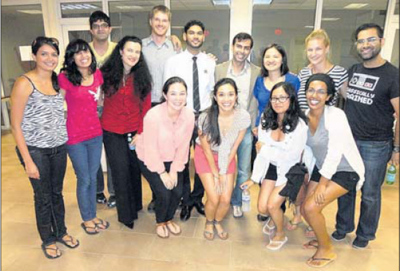The Daily Herald reports about the fact that Saba University School of Medicine’s (SUSOM) Global Health Club (GHC) held its third Global Health Seminar, Wednesday at campus. Among the club’s recent plans is the development of a public health awareness poster on dengue and a volunteer trip to serve poor communities in Peru.
GHC provides opportunities for students to increase awareness of current global health challenges, while encouraging their involvement in improving public health locally and globally through volunteerism. One of the goals is to increase awareness and address health needs on Saba through education and interaction. Students are encouraged to create initiatives towards improving health by building a relationship with community stakeholders.
Theme of the seminar presentations was the importance of local stakeholders taking full control over their own health issues.
The personal accounts of presenters bolstered the argument that building a healthy public policy involves strengthening community action, helping develop personal skills, creating supportive environments and reorienting health services towards prevention of diseases. Enabling, mediating and advocating of local public health choices were recurrent topics.
Student Jesse Kornbluth presented on “The Globalization of Suffering: Refugees, Torture, and Asylum in the Modern World.” He worked for New York-based organization Libertas for victims of torture. He lobbied for a policy prohibiting physicians to take any part in interrogation techniques involving torture.
Student Aman Haji spoke of his experience while working with Aga Khan Health Promotion Resource Center in north Pakistan. He evaluated programmes combating maternal and infant mortality and shared his challenges with finding sustainable ways of financing and delivering primary health care in the rural high-mountain valleys.
Adnaan Edun’s gave a personal account of what determined him to be one of the founding members of Students Helping Orphans Worldwide (SHOW), which combines sustainable development, financial stability and water well programmes with youth letter exchange, educational competitions and local solution think tanks. Programmes now extend to South Africa, Afghanistan, Kenya, Bangladesh, Morocco, Honduras, Pakistan and Peru. He gave a touching account of his experience as a volunteer at an orphanage in Peru.
Philip Baker also presented on maternal/child health and “Water-Lessons from the Arctic.” He worked with the Indigenous Health Adaptation to Climate Change, an organization working in the Arctic, Peru and Uganda. He highlighted striking parallels between the public health challenges of a community in Canada’s remote arctic region and Saba’s own water-related struggles. Baker drove home a powerful point about appreciating the expertise of local populations in knowing how to sustainably adapt. Baker also pointed to the resilient solidarity of communities and shared the story of how everybody in the arctic pitched-in when several calamities struck and outside help could not reach them.
Jackelyn Lau spoke of her experience with a thalassemia treatment programme in Sri Lanka and the challenge of managing the chronic disease in Kurunegala. Thalassemia are forms of inherited recessive blood disorders that originated in the Mediterranean region. She assisted with a long-term study on 200 diagnosed patients, collecting their history to devise treatment plans. The early diagnosis they assisted had an impact in allowing children to live past age 10 and well into adulthood.

 Archive of posts from Saba-News.com Archive Saba News
Archive of posts from Saba-News.com Archive Saba News